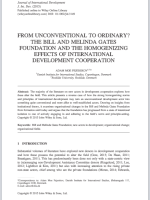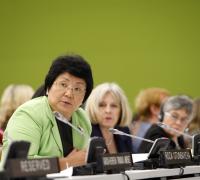The Bill and Melinda Gates Foundation's development from unconventional to ordinary
The issue of how new actors have entered into development cooperation over the last decade continues receive great attention. This is both explored with reference to states such as China, Brazil, South Korea or Turkey, and by studying non-state actors such as private foundations or celebrities.
Common for most such studies is a focus on how these actors challenge and transform the authority and legitimacy of established actors and their ways of ‘doing development’.
This article makes a reverse argument by exploring how the strong homogenizing effects of international development cooperation may do just the opposite and turn a novel and in many ways unconventional actor into something surprisingly similar to the established organizations.
It explores how the Bill and Melinda Gates Foundation has progressed from a state in which it fully understood its position vis-à-vis other actors in the field, yet was unwilling to assume an equal role as a donor organization, partaking in, or adhering to, processes of collective norm and principle setting and institutionalization, to a state of actively engaging in these processes, while still practicing a self-conception of difference from well-established donor organizations.
The research is done as part of the project GLONO – Global Norms and Heterogeneous Development Organizations.
DIIS Experts



